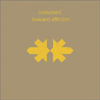 In the Pantheon of independent music, few individuals carry the kind ofmythic cachet that Clint Conley does. As a member of the jarringlyfierce Mission of Burma in the early 1980s, Conley established himselfas a thoughtful, powerful songwriter, crafting some of the mostenduring and seminal pieces of independent rock. The reach of Conley'scompositions like "Academy Fight Song" and "That's When I Reach For MyRevolver" can be seen as direct inspirations to a number of musiciansall over the spectrum, from Sonic Youth's Thurston Moore to pop-technopurveyor Moby. After Burma split in 1983, Conley took an extendedabsence (nineteen years!) from music and in this time started a familyand a new career as a producer for Boston's local WCVB-TV program'Chronicle.' It wasn't until two years ago that this epic writer'sblock lifted and Conley again felt the desire to step onto the stage.From these seeds of desire grew Consonant. Consonant is by no means theClint Conley show, however. Much like in Burma, Conley is surrounded byseveral accomplished musicians in their own right: guitarist ChrisBrokaw formerly of Come and Codeine, Matt Kadane formerly of Bedhead(and Brokaw band mate in The New Year), and Winston Braman formerly ofFuzzy. Also on board is poet Holly Anderson, who along with Conleywrites the bulk of the lyrics for their second album, "Love andAffliction." Each of these members brings their own contributions tothe sound, and upon listening it becomes apparent that Consonant is anextremely apt name. The different influences and additions all cometogether marvelously; never is a song lopsided or unbalanced. Thealbum's opener, "Little Murders" kicks in with a riff that is at onceimposing and yet delicately melodic. It is a deep sounding riff thatseems to fall over itself, perfectly contrasting the clear, reedyvocals. It is a remarkably full song, crashing down with a wave ofsound that rushes through the speakers. Throughout the album, thelyrics touch on relationships in impressionistic language, neverthrough narrative but rather in brief imagery that affects sensuallywith talk of shooting stars and "heat lightning fingers" like the track'Lost Together.' 'Night For Love,' a country-like homage, finds thesubjects locked in an embrace, giving us glimpses of the passion insuch a scene, where the moon and sky are spectators to "love andaffection," opposing the album's title. The band gets more literal on'Mysteries of the Holiday Camp,' a speedy track that captures theessence of traveling on a tour, especially as it is experienced throughthe eyes of someone who's been off the road for quite some time. 'She'sDriving Fast' eschews the deep sound of the other tracks for a sparse,lilting melody that mostly sits on its own, save the vocals. It nicelycaptures the sentimental air of the track, the feeling of early morningevoked by the thinness and pitch of the music. From there, Consonantdelves into the intense 'Cauldron,' with a surging chug of chords andsqualling guitar lines that are somewhat reminiscent of Burma at theirfiery peak. A climax of cymbals ends the song's quick consumption."Love and Affliction" is the sound of a collection of seasonedprofessionals who are capable of creating passionate, artistic rockmusic that can shake you into an enthusiastic pogo and still find itsway to touching the hearts and minds of the listeners, taking themalong to show them the forms rendered by the words and music. Theband's repitoire is stunningly versatile, cathartic and thoughtful.Intensity, poignancy; these are the elements of Consonant, and thesynthesis of these things is a beautiful expression that befits theirname.
In the Pantheon of independent music, few individuals carry the kind ofmythic cachet that Clint Conley does. As a member of the jarringlyfierce Mission of Burma in the early 1980s, Conley established himselfas a thoughtful, powerful songwriter, crafting some of the mostenduring and seminal pieces of independent rock. The reach of Conley'scompositions like "Academy Fight Song" and "That's When I Reach For MyRevolver" can be seen as direct inspirations to a number of musiciansall over the spectrum, from Sonic Youth's Thurston Moore to pop-technopurveyor Moby. After Burma split in 1983, Conley took an extendedabsence (nineteen years!) from music and in this time started a familyand a new career as a producer for Boston's local WCVB-TV program'Chronicle.' It wasn't until two years ago that this epic writer'sblock lifted and Conley again felt the desire to step onto the stage.From these seeds of desire grew Consonant. Consonant is by no means theClint Conley show, however. Much like in Burma, Conley is surrounded byseveral accomplished musicians in their own right: guitarist ChrisBrokaw formerly of Come and Codeine, Matt Kadane formerly of Bedhead(and Brokaw band mate in The New Year), and Winston Braman formerly ofFuzzy. Also on board is poet Holly Anderson, who along with Conleywrites the bulk of the lyrics for their second album, "Love andAffliction." Each of these members brings their own contributions tothe sound, and upon listening it becomes apparent that Consonant is anextremely apt name. The different influences and additions all cometogether marvelously; never is a song lopsided or unbalanced. Thealbum's opener, "Little Murders" kicks in with a riff that is at onceimposing and yet delicately melodic. It is a deep sounding riff thatseems to fall over itself, perfectly contrasting the clear, reedyvocals. It is a remarkably full song, crashing down with a wave ofsound that rushes through the speakers. Throughout the album, thelyrics touch on relationships in impressionistic language, neverthrough narrative but rather in brief imagery that affects sensuallywith talk of shooting stars and "heat lightning fingers" like the track'Lost Together.' 'Night For Love,' a country-like homage, finds thesubjects locked in an embrace, giving us glimpses of the passion insuch a scene, where the moon and sky are spectators to "love andaffection," opposing the album's title. The band gets more literal on'Mysteries of the Holiday Camp,' a speedy track that captures theessence of traveling on a tour, especially as it is experienced throughthe eyes of someone who's been off the road for quite some time. 'She'sDriving Fast' eschews the deep sound of the other tracks for a sparse,lilting melody that mostly sits on its own, save the vocals. It nicelycaptures the sentimental air of the track, the feeling of early morningevoked by the thinness and pitch of the music. From there, Consonantdelves into the intense 'Cauldron,' with a surging chug of chords andsqualling guitar lines that are somewhat reminiscent of Burma at theirfiery peak. A climax of cymbals ends the song's quick consumption."Love and Affliction" is the sound of a collection of seasonedprofessionals who are capable of creating passionate, artistic rockmusic that can shake you into an enthusiastic pogo and still find itsway to touching the hearts and minds of the listeners, taking themalong to show them the forms rendered by the words and music. Theband's repitoire is stunningly versatile, cathartic and thoughtful.Intensity, poignancy; these are the elements of Consonant, and thesynthesis of these things is a beautiful expression that befits theirname.samples:


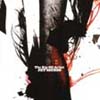 Matt Haines AKA The Rip Off Artist shows incredible nerve by naming his new outing Pet Sounds.The Beach Boys album of the same name probably enjoys the bestreputation of any single record in all pop music history. This shouldcome as no surprise, as previous ROA releases have similarly apedclassic rock album titles such as The Kids are Alright, Pump and Brain Salad Surgery. The Who, Aerosmith and ELP are miles away from the pure pop mastery of Brian Wilson's opus, however. Pet Soundsjust isn't an appropriate title for an album unless the artist caneither back it up with incredible musical content or, alternately,produce some kind post-ironic funny satire in keeping with such anabsurdly grandiose moniker. Matt Haines does neither. ROA's Pet Soundsis such an aggressively average, militantly unfunny album, it justpisses me off that he has saddled it with such an incredibly ballsytitle. These 15 tracks of boring, overprocessed electro-funk shouldhave been named after Pretzel Logic or Rumours, or someother shitty, overrated 70's-era blockbuster album. ROA's musicaltechnique is boring and overused. He begins with excruciatinglyubiquitous house and funk rhythms, and using the standard Powerbooksoftware, edits and processes them into IDM oblivion. The end productis something in the neighborhood of the cut-up funk-house of The SoftPink Truth, without any of the wit, intelligence or groove. Tracks suchas "Meat Shall We Eat" and "Bear Down" are generic, soulless cut n'splice house tracks that somehow end up seeming overlong even thoughthey rarely exceed the four-minute mark. Vocals appear on some tracks,and do nothing to warm up the hackneyed mess. This sort of facelessstreamlining of soul and funk influenced house music has already beendone long ago and better on Thomas Brinkmann's Soul Center albums. Thiswill definitely appeal to all of the IDM fanboys who never seem to getenough of this kind of trite, unexceptional laptop annoyance. MattHaines has invented an absurd biography for himself, and named thisdreary album Pet Sounds in a bid to garner attention to whatwould otherwise be seen as another boring entrée into an overpopulatedgenre. Don't fall for this cynical ruse.
Matt Haines AKA The Rip Off Artist shows incredible nerve by naming his new outing Pet Sounds.The Beach Boys album of the same name probably enjoys the bestreputation of any single record in all pop music history. This shouldcome as no surprise, as previous ROA releases have similarly apedclassic rock album titles such as The Kids are Alright, Pump and Brain Salad Surgery. The Who, Aerosmith and ELP are miles away from the pure pop mastery of Brian Wilson's opus, however. Pet Soundsjust isn't an appropriate title for an album unless the artist caneither back it up with incredible musical content or, alternately,produce some kind post-ironic funny satire in keeping with such anabsurdly grandiose moniker. Matt Haines does neither. ROA's Pet Soundsis such an aggressively average, militantly unfunny album, it justpisses me off that he has saddled it with such an incredibly ballsytitle. These 15 tracks of boring, overprocessed electro-funk shouldhave been named after Pretzel Logic or Rumours, or someother shitty, overrated 70's-era blockbuster album. ROA's musicaltechnique is boring and overused. He begins with excruciatinglyubiquitous house and funk rhythms, and using the standard Powerbooksoftware, edits and processes them into IDM oblivion. The end productis something in the neighborhood of the cut-up funk-house of The SoftPink Truth, without any of the wit, intelligence or groove. Tracks suchas "Meat Shall We Eat" and "Bear Down" are generic, soulless cut n'splice house tracks that somehow end up seeming overlong even thoughthey rarely exceed the four-minute mark. Vocals appear on some tracks,and do nothing to warm up the hackneyed mess. This sort of facelessstreamlining of soul and funk influenced house music has already beendone long ago and better on Thomas Brinkmann's Soul Center albums. Thiswill definitely appeal to all of the IDM fanboys who never seem to getenough of this kind of trite, unexceptional laptop annoyance. MattHaines has invented an absurd biography for himself, and named thisdreary album Pet Sounds in a bid to garner attention to whatwould otherwise be seen as another boring entrée into an overpopulatedgenre. Don't fall for this cynical ruse. Put simply, this is a confusing mix of popular rock radio in the US and80's pop music that somehow proves mostly irresistible. The first fewsongs have an undeniable rock feel to them that just seem a bit flat.When I first heard it I couldn't help but compare it to some US radiostaples but there is something extra that makes such a comparison justa little unfair: the song-writing is very strong and doesn't become oldafter just a few listens plus careful attention has been given toatmospherics and particulars. The smallest sounds make all thedifference as they are given the chance to rise above the anthem-likechoruses and drilling guitars. After the first two tracks and swam by,"How Far Is Too Far?" sweeps and dives into the air by way of chuggingbass playing and symphonic string arrangements. It's a catchy andaddictive tune and I'd be cheating it out if I didn't mention howpretty it is. Maus are very good at marrying the catchy with thesubstantial and for the most part, they strike a good balance betweenthe two on each track. The lyrics are a nice cross between thedramatic, the romantic, and the inquistive: though many of the wordsseem to revolve around a significant other, emotional revolt, orpersonal identity, there's a nice smattering of the surreal and strangehere and there. Though I can't listen to the album multiple times in arow without getting a little bored, there are times when the melodies,rhythms, and lyrics are all stuck in my head and simply won't leaveuntil I listen to the music. And so I must obey and jam out to Musickuntil it becomes just a little too sweet for me. I find that listeningto the first half of the album and coming back to the second half lateris helpful. This music isn't what I typically listen to but I can'tdeny that small doses of it here and there are a lot of fun.
Put simply, this is a confusing mix of popular rock radio in the US and80's pop music that somehow proves mostly irresistible. The first fewsongs have an undeniable rock feel to them that just seem a bit flat.When I first heard it I couldn't help but compare it to some US radiostaples but there is something extra that makes such a comparison justa little unfair: the song-writing is very strong and doesn't become oldafter just a few listens plus careful attention has been given toatmospherics and particulars. The smallest sounds make all thedifference as they are given the chance to rise above the anthem-likechoruses and drilling guitars. After the first two tracks and swam by,"How Far Is Too Far?" sweeps and dives into the air by way of chuggingbass playing and symphonic string arrangements. It's a catchy andaddictive tune and I'd be cheating it out if I didn't mention howpretty it is. Maus are very good at marrying the catchy with thesubstantial and for the most part, they strike a good balance betweenthe two on each track. The lyrics are a nice cross between thedramatic, the romantic, and the inquistive: though many of the wordsseem to revolve around a significant other, emotional revolt, orpersonal identity, there's a nice smattering of the surreal and strangehere and there. Though I can't listen to the album multiple times in arow without getting a little bored, there are times when the melodies,rhythms, and lyrics are all stuck in my head and simply won't leaveuntil I listen to the music. And so I must obey and jam out to Musickuntil it becomes just a little too sweet for me. I find that listeningto the first half of the album and coming back to the second half lateris helpful. This music isn't what I typically listen to but I can'tdeny that small doses of it here and there are a lot of fun.  The continuing spiritual decline of the Western World and the KharmicRepercussions of Tory B. Liar and his deathsucking corporate lap-poodletrips into repressive homogeneity spell one thing for the un-UnitedKingdom. DOOM. However, two hundred years ago many would have calledthe fact that a shining disc with the power to summon demons had flownall the way from Deutschland to help me out MAGIC. Daniel Menche isobviously on a path far out from the vapid mediocrity of the patheticdrivel that passes for much of Western Culture. He styles himself as anEastern Warrior living in the West. I will now style him the UltimateGrand Master of Noise. This one disc is worth a million Merboxes. Thepurpose of Invokeris to summon demons and it works. Beware that this is a dangerous tripand unless you can call on powerful spirits to guide you, you mightunleash horrific consequences for your soul. Luckily I had the help andguidance of the Eternal Spirit of William S. Burroughs to show me howto fold the demons into a New Reality. You might not be so fortunateand this is no path for the weak willed or trendy dabbler in noise. Itmakes Coil's Themes for Hellraiser sound like the bleedin' Theme forthe Magic Roundabout in comparison and that's not a put down deliveredlightly. Do not even think about listening to this unless you are ableto direct Total Nightmare Encounters and use them to your advantage,and the greater advantage of the struggle to stop the farcical tragedythat the megalomaniac fools who think they can crush and control thehuman will are intent on provoking. All hell is breaking loose.
The continuing spiritual decline of the Western World and the KharmicRepercussions of Tory B. Liar and his deathsucking corporate lap-poodletrips into repressive homogeneity spell one thing for the un-UnitedKingdom. DOOM. However, two hundred years ago many would have calledthe fact that a shining disc with the power to summon demons had flownall the way from Deutschland to help me out MAGIC. Daniel Menche isobviously on a path far out from the vapid mediocrity of the patheticdrivel that passes for much of Western Culture. He styles himself as anEastern Warrior living in the West. I will now style him the UltimateGrand Master of Noise. This one disc is worth a million Merboxes. Thepurpose of Invokeris to summon demons and it works. Beware that this is a dangerous tripand unless you can call on powerful spirits to guide you, you mightunleash horrific consequences for your soul. Luckily I had the help andguidance of the Eternal Spirit of William S. Burroughs to show me howto fold the demons into a New Reality. You might not be so fortunateand this is no path for the weak willed or trendy dabbler in noise. Itmakes Coil's Themes for Hellraiser sound like the bleedin' Theme forthe Magic Roundabout in comparison and that's not a put down deliveredlightly. Do not even think about listening to this unless you are ableto direct Total Nightmare Encounters and use them to your advantage,and the greater advantage of the struggle to stop the farcical tragedythat the megalomaniac fools who think they can crush and control thehuman will are intent on provoking. All hell is breaking loose.  I leant an ear to the previous Sonic Mook compilation mostly becauseColin Newman plugged it on a radio show for Resonance FM during hisfascination with the 'return to rock' which he felt was happening. Rocknever really went away though. There were a few good tracks amongst theinevitable mediocrity and Liars turned out to be a great live band.This third Sonic Mook compilation is mostly so dire it's tragic. Mostof these bands seem to be making utterly botched attempts to filterpunk rock, disco, glam and electro pop through inept lo-fi lobestrainers. The gist seems to be that even if you have little talent,even so little as to be comedic, but have plenty of attitude then youshould feel free to waste everyone's time with your puerile mash upantics. Unfortunately for some of these clowns, some of us have anincling of just how fast time is running out. Each of the twenty-fourbands has been saddled with a patronising little self-beliefsoubriquet, as if their rehashed audio-stew isn't enough in itself tojustify their existance. The turgid Big Two Hundred have the memo'Persistance and determination alone are ominipotent.' Not if this isthe best they could do - watch them disappear. The funniest band mightbe Bane Overlord, whose singer has stolen his entire shtick from Liarsbut lost the essential fraction (weird lyrics, a small dose oforiginality and experimentation), and their drummer makes a go ofwooden funk. At least they're so bad they're funny, unlike the feysynthpopper Ed Laliq who redefines boundaries of dated tedium. !!! suckdue to a crap annoying singer and get my vote as the most over-ratedband with a Brainwashed website [Owch! —Ed.].Radio 4 want to be Gang of 4 so much they couldn't even change thenumber even though there are more than four of them, and at least theycan play even if they are a bit dull and worthy. Valerie can probablyhardly play and couldn't be called dull live, but "Popstar" shows abrash lack of ambition with a song about getting a review in the eNMEy.They are being ironic and are a spit in the face of every serious musowannabe band. I'd like to think irony is at the wooden heart of thepainfully awful Pink Grease, a comedy glam racket who aren't evenfunny. Chrome Hoof at least don't bother with annoying vocals and arecontent to try out being a third rate Add N to (X) rip off. Kings HaveLong Arms are Donna Summer reimagined by a Sheffield beer belly, butmuch less interesting than that might seem. The incredibly over-ratedErase Errata, who are like a less spiky Dogfaced Hermans, contribute alistenable yet forgettable track. This is infinitely preferable to theweak and putrid Lamaque-yoof fodder spewed up by the new wave of newwave of new wave of new wave of diminishing reruns heralded by thesoulless mundanity of Klang and Mommy and Daddy. A few bands transcendthe line of mediocrity below which the tepid diahorrea stirs. The YeahYeahs Yeahs "Machine" is an old song you probably already heard, and itkicks a small bit of wild west ass; Ex Models might be OK if this tightwound strut is one of their weaker tracks, and like The Martini HenryRifles at least summon some energy; and Part Chimp seem out of place bybeing a band who actually rock hard, but their guitarist Tim Cedar'sbeen kicking out the jams for ages now in bands such as Loveblobs,Ligament and Penthouse, so that's no big surprise. If you find this inthe bargain bin for a dollar or two like I did, then this is worthgetting for the Part Chimp track, but you might as well just buy theiralbum instead and cut out all the dated jokes without punchlines.
I leant an ear to the previous Sonic Mook compilation mostly becauseColin Newman plugged it on a radio show for Resonance FM during hisfascination with the 'return to rock' which he felt was happening. Rocknever really went away though. There were a few good tracks amongst theinevitable mediocrity and Liars turned out to be a great live band.This third Sonic Mook compilation is mostly so dire it's tragic. Mostof these bands seem to be making utterly botched attempts to filterpunk rock, disco, glam and electro pop through inept lo-fi lobestrainers. The gist seems to be that even if you have little talent,even so little as to be comedic, but have plenty of attitude then youshould feel free to waste everyone's time with your puerile mash upantics. Unfortunately for some of these clowns, some of us have anincling of just how fast time is running out. Each of the twenty-fourbands has been saddled with a patronising little self-beliefsoubriquet, as if their rehashed audio-stew isn't enough in itself tojustify their existance. The turgid Big Two Hundred have the memo'Persistance and determination alone are ominipotent.' Not if this isthe best they could do - watch them disappear. The funniest band mightbe Bane Overlord, whose singer has stolen his entire shtick from Liarsbut lost the essential fraction (weird lyrics, a small dose oforiginality and experimentation), and their drummer makes a go ofwooden funk. At least they're so bad they're funny, unlike the feysynthpopper Ed Laliq who redefines boundaries of dated tedium. !!! suckdue to a crap annoying singer and get my vote as the most over-ratedband with a Brainwashed website [Owch! —Ed.].Radio 4 want to be Gang of 4 so much they couldn't even change thenumber even though there are more than four of them, and at least theycan play even if they are a bit dull and worthy. Valerie can probablyhardly play and couldn't be called dull live, but "Popstar" shows abrash lack of ambition with a song about getting a review in the eNMEy.They are being ironic and are a spit in the face of every serious musowannabe band. I'd like to think irony is at the wooden heart of thepainfully awful Pink Grease, a comedy glam racket who aren't evenfunny. Chrome Hoof at least don't bother with annoying vocals and arecontent to try out being a third rate Add N to (X) rip off. Kings HaveLong Arms are Donna Summer reimagined by a Sheffield beer belly, butmuch less interesting than that might seem. The incredibly over-ratedErase Errata, who are like a less spiky Dogfaced Hermans, contribute alistenable yet forgettable track. This is infinitely preferable to theweak and putrid Lamaque-yoof fodder spewed up by the new wave of newwave of new wave of new wave of diminishing reruns heralded by thesoulless mundanity of Klang and Mommy and Daddy. A few bands transcendthe line of mediocrity below which the tepid diahorrea stirs. The YeahYeahs Yeahs "Machine" is an old song you probably already heard, and itkicks a small bit of wild west ass; Ex Models might be OK if this tightwound strut is one of their weaker tracks, and like The Martini HenryRifles at least summon some energy; and Part Chimp seem out of place bybeing a band who actually rock hard, but their guitarist Tim Cedar'sbeen kicking out the jams for ages now in bands such as Loveblobs,Ligament and Penthouse, so that's no big surprise. If you find this inthe bargain bin for a dollar or two like I did, then this is worthgetting for the Part Chimp track, but you might as well just buy theiralbum instead and cut out all the dated jokes without punchlines. 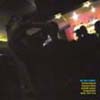 Go download audiomulch from www.audiomulch.com. Fuck about with it forhalf an hour or so and you could almost certainly come up withsomething more interesting than all but two of the tracks on thismediocre compilation. When Merbox II has taken total noise to the topof the hip hops courtesy of the Gay Area of EMI, then there is only oneplace to hide for the diminishing returns of the audio sadist. Thatplace is sheer monotony. Mr Bow (don't call him Merz he hasn't the bassto deserve it since he started conveniance laptopping) drizzles guzzlyover the eager upturned noise gob of Mr Karkowski until Mr Karkowskiwalks out with his dustbin lid in eternal boredom at a completelyun-shocking display of mouldy old dough. That's nothing compared to thestudy in repeat loop tedium provided by Francisco Lopez. There is helpat hand in the form of Gescom who are out of place by actually seemingto give a fuck. How their fellow mentalist experimenters in noise andrepetition must have laughed when they played their electroacoustichomage that actually had some shape and form and did more than merelyexist! A whole album of such nice whooshing would be welcome, even ifthey pale next to the best composers on the Empreintes Digitales label,who I will be writing about very soon. Hecker recorded some austerealmost annoying tones in a few seconds, like crap watch alarms, but doyou really want to hear them more than once? If so you are probably thekind who'll lap up the boring high pitched drivel of Shirt Trax.Incapacitants hold a routine full on screaming grinding onslaught fortough loving pigs everywhere. This seems to be a compilation of themost throw away tracks almost all of the contributing artists have everrecorded. Originally it was going to be released on mini-disc,presumably because most of the tracks seem like mere building blocks.Farmersmanual pull some context from the mess, on two counts. Firsttheir opening track is a minor beauty. Later they play some fairlybland laptop improvisation that I suspect they'd probably like to thinkis more abstract than it is, whilst some ravers fail to get angry andjust request nicely that they drop a bass line so they can dance theirtits off. Farmersmanual don't oblige and just keep chunkling inSheffield. It seems the days when noise could incite riots are gone, orat least lost in the summer lovin' ecstacy of the mundane offcutfreakshow that OR, the Damien Hirst of record labels, has compiledhere. Even Russell Haswell's mum loves a bit of OR very now and again."Lovely, lovely dear, sounds just like me fridge!"
Go download audiomulch from www.audiomulch.com. Fuck about with it forhalf an hour or so and you could almost certainly come up withsomething more interesting than all but two of the tracks on thismediocre compilation. When Merbox II has taken total noise to the topof the hip hops courtesy of the Gay Area of EMI, then there is only oneplace to hide for the diminishing returns of the audio sadist. Thatplace is sheer monotony. Mr Bow (don't call him Merz he hasn't the bassto deserve it since he started conveniance laptopping) drizzles guzzlyover the eager upturned noise gob of Mr Karkowski until Mr Karkowskiwalks out with his dustbin lid in eternal boredom at a completelyun-shocking display of mouldy old dough. That's nothing compared to thestudy in repeat loop tedium provided by Francisco Lopez. There is helpat hand in the form of Gescom who are out of place by actually seemingto give a fuck. How their fellow mentalist experimenters in noise andrepetition must have laughed when they played their electroacoustichomage that actually had some shape and form and did more than merelyexist! A whole album of such nice whooshing would be welcome, even ifthey pale next to the best composers on the Empreintes Digitales label,who I will be writing about very soon. Hecker recorded some austerealmost annoying tones in a few seconds, like crap watch alarms, but doyou really want to hear them more than once? If so you are probably thekind who'll lap up the boring high pitched drivel of Shirt Trax.Incapacitants hold a routine full on screaming grinding onslaught fortough loving pigs everywhere. This seems to be a compilation of themost throw away tracks almost all of the contributing artists have everrecorded. Originally it was going to be released on mini-disc,presumably because most of the tracks seem like mere building blocks.Farmersmanual pull some context from the mess, on two counts. Firsttheir opening track is a minor beauty. Later they play some fairlybland laptop improvisation that I suspect they'd probably like to thinkis more abstract than it is, whilst some ravers fail to get angry andjust request nicely that they drop a bass line so they can dance theirtits off. Farmersmanual don't oblige and just keep chunkling inSheffield. It seems the days when noise could incite riots are gone, orat least lost in the summer lovin' ecstacy of the mundane offcutfreakshow that OR, the Damien Hirst of record labels, has compiledhere. Even Russell Haswell's mum loves a bit of OR very now and again."Lovely, lovely dear, sounds just like me fridge!"  Silkworm are one of those bands who have never really clicked for me,even though lots of cool people including Chris Brokaw and Steve Albiniseem to like them. Shellac are a band whose kick ass originality andhumourous spiky guitar antics have me rushing out to the record shop tobuy each new record on the week of release. A cover of Shellac song isa rare thing. So when Silkworm pay homage with the most obviouslycoverable Shellac song, "Prayer to God," based as it seems to be on theKettle Well murder ballad that Steve Albini and Zeni Geva hadpreviously thrashed out, it might just be a way into their world."Prayer to God" (otherwise known as The-Fucking-Kill-Him-Song) opensShellac's most recent album 1000 Hurtsand always seemed to me to be ripe for a reinterpretation by thatblackly flapping murder balladeer Nick Cave. I guess Silkworm will do,even if the royalty payments to the Electrical Audio Recordists and thethin hair care products warehouse manager who drums on his days offwon't buy them quite as much record shampoo. Well of course it doesn'tcome close to the original and since there's no way to out-rockShellac, especially with no drums, Silkworm take the only sensibleroute and quieten it all down with loose acoustic hillbilly threats.The big rock explosion of the original when Steve screams, "Him justfuckin' kill him," is taken down to an ominous whisper. The way theysing the final amen is almost as if they don't actually care about allthis revenge murder so much. Then they toss off a fairly uneventfulcampfire mandolin strum at a Pavement B-side that was originally mootedas an aborted A-side, and completely ruin a great atmospheric Bedheadsong. There's something about the vocal limitations of the thereeSilkworm singers that loses all the warm vulnerability of the Kadanebrothers. The best track here is their cover of Robbie Fulks' "LetsKill Saturday Night," on which they nail the world weary smalltownescapism of people who don't set themselves on fire with kerosene, butprobably talk about it from time to time. One of them does this reallyneat high pitched hoedown backing vocal on the chorus that makes thewhole damn EP. Appropriately the last song asks "Is That All There Is"and shows what a desolated inspiration Nina Nastasia has been to theirlost dreams.
Silkworm are one of those bands who have never really clicked for me,even though lots of cool people including Chris Brokaw and Steve Albiniseem to like them. Shellac are a band whose kick ass originality andhumourous spiky guitar antics have me rushing out to the record shop tobuy each new record on the week of release. A cover of Shellac song isa rare thing. So when Silkworm pay homage with the most obviouslycoverable Shellac song, "Prayer to God," based as it seems to be on theKettle Well murder ballad that Steve Albini and Zeni Geva hadpreviously thrashed out, it might just be a way into their world."Prayer to God" (otherwise known as The-Fucking-Kill-Him-Song) opensShellac's most recent album 1000 Hurtsand always seemed to me to be ripe for a reinterpretation by thatblackly flapping murder balladeer Nick Cave. I guess Silkworm will do,even if the royalty payments to the Electrical Audio Recordists and thethin hair care products warehouse manager who drums on his days offwon't buy them quite as much record shampoo. Well of course it doesn'tcome close to the original and since there's no way to out-rockShellac, especially with no drums, Silkworm take the only sensibleroute and quieten it all down with loose acoustic hillbilly threats.The big rock explosion of the original when Steve screams, "Him justfuckin' kill him," is taken down to an ominous whisper. The way theysing the final amen is almost as if they don't actually care about allthis revenge murder so much. Then they toss off a fairly uneventfulcampfire mandolin strum at a Pavement B-side that was originally mootedas an aborted A-side, and completely ruin a great atmospheric Bedheadsong. There's something about the vocal limitations of the thereeSilkworm singers that loses all the warm vulnerability of the Kadanebrothers. The best track here is their cover of Robbie Fulks' "LetsKill Saturday Night," on which they nail the world weary smalltownescapism of people who don't set themselves on fire with kerosene, butprobably talk about it from time to time. One of them does this reallyneat high pitched hoedown backing vocal on the chorus that makes thewhole damn EP. Appropriately the last song asks "Is That All There Is"and shows what a desolated inspiration Nina Nastasia has been to theirlost dreams. 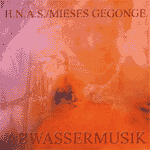 Abwassermusik of 1985 was the first H.N.A.S. LP and was culled from the duo's earlier cassette works. Credited to H.N.A.S. and Mieses Gegonge,the record is the most raw of these first five, relying heavily on themanipulated loops and cut-ups that ground the H.N.A.S. sound, and lesson the unique instrumentation that dominates the next three records. Arudimentary industrial sound carries over most tracks, but hereelements of kraut-rock and tinges of surrealism do emerge. The album'slong centerpiece recalls Throbbing Gristle at first, though evolvesinto a chorus of tribal drums, chirps, and theremin flourishes. As onmost all of these Dom reissues, an album's length of bonus tracks hasbeen added here, most very early, very sparse tape works. Exceptionsand highlights include a pummeling live track from Mieses Gegonge,sounding something like 18 drug-addled Faust-ians grooving in thebottom of a lake, and the first H.N.A.S. vinyl release, an earlyshowcase for Heemann's elegant drones.
Abwassermusik of 1985 was the first H.N.A.S. LP and was culled from the duo's earlier cassette works. Credited to H.N.A.S. and Mieses Gegonge,the record is the most raw of these first five, relying heavily on themanipulated loops and cut-ups that ground the H.N.A.S. sound, and lesson the unique instrumentation that dominates the next three records. Arudimentary industrial sound carries over most tracks, but hereelements of kraut-rock and tinges of surrealism do emerge. The album'slong centerpiece recalls Throbbing Gristle at first, though evolvesinto a chorus of tribal drums, chirps, and theremin flourishes. As onmost all of these Dom reissues, an album's length of bonus tracks hasbeen added here, most very early, very sparse tape works. Exceptionsand highlights include a pummeling live track from Mieses Gegonge,sounding something like 18 drug-addled Faust-ians grooving in thebottom of a lake, and the first H.N.A.S. vinyl release, an earlyshowcase for Heemann's elegant drones.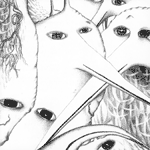 Melchior, released by United Dairies and featuring StevenStapleton and wife Diana Rogerson, is the first in the great trilogy ofearly H.N.A.S. albums. The increased influence of surrealism is notablefrom the start in a brilliant faux-lounge number complete withRogerson's twisted croon. The record is indulgently theatrical in manyplaces; humorous shouting bits and guitar flourishes fill the gapsbetween more overt kraut-rock borrowing (surprisingly Achim has said atthe time the band "knew nothing about Faust, Neu! and all the OHR/Krautbands...") and handclap-ful post punk jogs. The whole mess isbeautifully paced with soothing guitar lines and Heemann's incomparabledrones rescuing each moment of acid-headed confusion. Bonus tracks aremainly '85/'86 era H.N.A.S. tunes, including one of the first (andbest) songs recorded by the Melchior line-up, a gnarled landscape oftrumpet squeal and organ pulse with the spoken refrain, "Listen to thesun rise, hear the birds scream." Experimentation with a variety ofunlikely instruments is at a high among these tracks, creating anatmosphere so difficult to place that it belongs solely to the agelessobscurity of the Dadaists.
Melchior, released by United Dairies and featuring StevenStapleton and wife Diana Rogerson, is the first in the great trilogy ofearly H.N.A.S. albums. The increased influence of surrealism is notablefrom the start in a brilliant faux-lounge number complete withRogerson's twisted croon. The record is indulgently theatrical in manyplaces; humorous shouting bits and guitar flourishes fill the gapsbetween more overt kraut-rock borrowing (surprisingly Achim has said atthe time the band "knew nothing about Faust, Neu! and all the OHR/Krautbands...") and handclap-ful post punk jogs. The whole mess isbeautifully paced with soothing guitar lines and Heemann's incomparabledrones rescuing each moment of acid-headed confusion. Bonus tracks aremainly '85/'86 era H.N.A.S. tunes, including one of the first (andbest) songs recorded by the Melchior line-up, a gnarled landscape oftrumpet squeal and organ pulse with the spoken refrain, "Listen to thesun rise, hear the birds scream." Experimentation with a variety ofunlikely instruments is at a high among these tracks, creating anatmosphere so difficult to place that it belongs solely to the agelessobscurity of the Dadaists.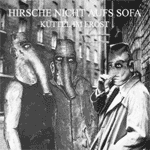 Recorded around the same time as Melchior, Küttel Im Frostis often described as the most pop of H.N.A.S. records. According toAchim, its primary influence was early Chrome, but where it is at allsimilar, Küttel towers above its peers. Rogerson's vocalsreturn, but they've gone from surreal chanteuse to psych screamer. Theastounding title track marks a peak in kraut-rock similarity withoutgiving an inch; it's quickly and artfully unclear how much of a mockeryKüttel's mish-mash of raucous pop and noise-burst is supposed tobe. Bonus tracks all come from H.N.A.S.' first of only two liveappearances. The concert is an excellent addition to this disc as muchof the performance comes from the Küttel album.
Recorded around the same time as Melchior, Küttel Im Frostis often described as the most pop of H.N.A.S. records. According toAchim, its primary influence was early Chrome, but where it is at allsimilar, Küttel towers above its peers. Rogerson's vocalsreturn, but they've gone from surreal chanteuse to psych screamer. Theastounding title track marks a peak in kraut-rock similarity withoutgiving an inch; it's quickly and artfully unclear how much of a mockeryKüttel's mish-mash of raucous pop and noise-burst is supposed tobe. Bonus tracks all come from H.N.A.S.' first of only two liveappearances. The concert is an excellent addition to this disc as muchof the performance comes from the Küttel album.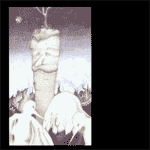 Im Schatten Der Möhre, the third of the truly amazing earlyH.N.A.S. works and the only one Heemann has felt necessary to reissueon his Streamline label, combines the tenuous, staged beauty of Melchior and the twisted jubilation of Küttel to glorious effect. More dense and cohesive than its predecessors, Im Schattenis also less humorous and more demanding. As such, the album could bethe group's most substantial. Bonus tracks here continue on Im Schatten'smore abstract bent, fore-grounding Heemann's future work in Mimir andMirror. Most are compilation tracks or studio outtakes from the '89-'91period, samples, tape loops, and guitar licks (courtesy of Heeman andbrother Andreas Martin) have never been harder to peel apart or label.
Im Schatten Der Möhre, the third of the truly amazing earlyH.N.A.S. works and the only one Heemann has felt necessary to reissueon his Streamline label, combines the tenuous, staged beauty of Melchior and the twisted jubilation of Küttel to glorious effect. More dense and cohesive than its predecessors, Im Schattenis also less humorous and more demanding. As such, the album could bethe group's most substantial. Bonus tracks here continue on Im Schatten'smore abstract bent, fore-grounding Heemann's future work in Mimir andMirror. Most are compilation tracks or studio outtakes from the '89-'91period, samples, tape loops, and guitar licks (courtesy of Heeman andbrother Andreas Martin) have never been harder to peel apart or label. The release that should be the least substantial, 1988's The Book of Deingenskirchen,comprised of the group's unaltered '86 - '88 studio leftovers, is oddlyone of the most entertaining. Understandably more choppy and raw than Aberwassermusik, Bookfeatures a bare-bones industrial sound with elegant, even playfulinterludes and spoken female vocals throughout. Despite its beingessentially a trash heap, Book is the most soothing of allearly H.N.A.S.; comparable to falling in and out of sleep during an oldGerman art film. The bonus material here is by far the most various,collecting obscure compilation tracks from '85 to '92. Bizarre Melchior-ianswing tunes line up next to driving kraut grooves, pseudo-surf tracks,alien drones and absurd found sounds, all effortlessly pieced togetherin the way only H.N.A.S. can, or would.
The release that should be the least substantial, 1988's The Book of Deingenskirchen,comprised of the group's unaltered '86 - '88 studio leftovers, is oddlyone of the most entertaining. Understandably more choppy and raw than Aberwassermusik, Bookfeatures a bare-bones industrial sound with elegant, even playfulinterludes and spoken female vocals throughout. Despite its beingessentially a trash heap, Book is the most soothing of allearly H.N.A.S.; comparable to falling in and out of sleep during an oldGerman art film. The bonus material here is by far the most various,collecting obscure compilation tracks from '85 to '92. Bizarre Melchior-ianswing tunes line up next to driving kraut grooves, pseudo-surf tracks,alien drones and absurd found sounds, all effortlessly pieced togetherin the way only H.N.A.S. can, or would. It's been a tumultuous ride for Greg Dulli. The Afghan Whigs stormedonto the scene in 1986, determined to destroy all the walls that stoodin their way. As the years went by, they slowly metamorphosed into asex rock project, with Dulli's howl shifting more into a purr meant tocoax off panties rather than bust down barriers. And then, after threelabels and fifteen years, they called it quits. Dulli had alreadystarted his new project in the Twilight Singers, but their debut waslanguid and laden with death imagery, probably because Dulli wrote therecord in the pit of a depression determined to kill him. Needless tosay, it didn't fly off the record shelves, despite the best efforts ofFila Brazilia to dance up the dirges. It was time for a change, itseemed, as Dulli parted ways with his second major record label in fiveyears. Now with a firm cheering section in place with Birdman, it feelslike Dulli has hit his stride again, and he's brought the angry swaggerwith it. This limited edition EP is the first new Twilight Singersmaterial in 3 years, featuring a cover and two original tracks. Wherethe Twilight Singers used to be a mellow affair with scattered dancebeats, now it's as if Dulli decided his two bands needed to become one."Black is the Color of My True Love's Hair" is a traditional that NinaSimone made famous, and as he did on Uptown Avondalewith classic soul numbers, Dulli makes it his own with classic verve.It starts off like any Twilight Singers song would, but when theguitars join with Dulli's screams, it's like the Whigs at their height:goosebumps galore. "Domani," too, at first is more like what you'dexpect from the Singers, with soul licks and that sexy vocal. But againthe wall of guitars return halfway through the song, and the Singersare born anew. "Now I can see, everything's clear up here from myposition" says it all as Dulli's confidence has never been thischarged. "Son of the Morning Star" sounds like a remix of anothertrack, with faded vocals and a rapid-fire dance beat. The track's a bitof a throwaway until the strings come in, and even then I wouldprobably skip it on repeat listens. On the strength of the first twotracks, though, the forthcoming album should be a real treat withplenty of sex to go around.
It's been a tumultuous ride for Greg Dulli. The Afghan Whigs stormedonto the scene in 1986, determined to destroy all the walls that stoodin their way. As the years went by, they slowly metamorphosed into asex rock project, with Dulli's howl shifting more into a purr meant tocoax off panties rather than bust down barriers. And then, after threelabels and fifteen years, they called it quits. Dulli had alreadystarted his new project in the Twilight Singers, but their debut waslanguid and laden with death imagery, probably because Dulli wrote therecord in the pit of a depression determined to kill him. Needless tosay, it didn't fly off the record shelves, despite the best efforts ofFila Brazilia to dance up the dirges. It was time for a change, itseemed, as Dulli parted ways with his second major record label in fiveyears. Now with a firm cheering section in place with Birdman, it feelslike Dulli has hit his stride again, and he's brought the angry swaggerwith it. This limited edition EP is the first new Twilight Singersmaterial in 3 years, featuring a cover and two original tracks. Wherethe Twilight Singers used to be a mellow affair with scattered dancebeats, now it's as if Dulli decided his two bands needed to become one."Black is the Color of My True Love's Hair" is a traditional that NinaSimone made famous, and as he did on Uptown Avondalewith classic soul numbers, Dulli makes it his own with classic verve.It starts off like any Twilight Singers song would, but when theguitars join with Dulli's screams, it's like the Whigs at their height:goosebumps galore. "Domani," too, at first is more like what you'dexpect from the Singers, with soul licks and that sexy vocal. But againthe wall of guitars return halfway through the song, and the Singersare born anew. "Now I can see, everything's clear up here from myposition" says it all as Dulli's confidence has never been thischarged. "Son of the Morning Star" sounds like a remix of anothertrack, with faded vocals and a rapid-fire dance beat. The track's a bitof a throwaway until the strings come in, and even then I wouldprobably skip it on repeat listens. On the strength of the first twotracks, though, the forthcoming album should be a real treat withplenty of sex to go around.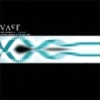 Turquoise is the stronger of the two mini-albums, withharder-edged arrangements and performances. The title track starts offwith the bitter anger of loneliness, and its a tone that remainsthroughout with occasional moments of slower tempo and quiet. There's acold that runs at the core of all these songs, like there's nothingleft at the end of the day to run on. This music is the loss of a loveror a loved one, of innocence, and of dreams you hoped would materializebut always really knew would melt away. As a result, the lyrics givevery little in terms of hope. Some of the lyrics are a bit on the triteside, as well, so my hope is that some of them will change before thefinal release, or the weaker songs will be left off entirely ("Can'tSay No to You" and "Candle" are prime examples). But there is an energyin these songs that is undeniable. Crosby is lashing out, but he's notproceeding unabated. He wants forgiveness, he wants to belong tosomething or someone. That doesn't mean he can't be bitter about notbelonging now. He also has a real gift for melody that shines throughany rough spots that exist. "I Woke Up LA" and "Falling From the Sky"are powerhouse songs, and "Desert Garden" brings to life a futilitythat everyone has felt at some point. Turquoise soars with melodies andhooks, stumbles a little lyrically, but overall walks on its own twofeet with confidence.
Turquoise is the stronger of the two mini-albums, withharder-edged arrangements and performances. The title track starts offwith the bitter anger of loneliness, and its a tone that remainsthroughout with occasional moments of slower tempo and quiet. There's acold that runs at the core of all these songs, like there's nothingleft at the end of the day to run on. This music is the loss of a loveror a loved one, of innocence, and of dreams you hoped would materializebut always really knew would melt away. As a result, the lyrics givevery little in terms of hope. Some of the lyrics are a bit on the triteside, as well, so my hope is that some of them will change before thefinal release, or the weaker songs will be left off entirely ("Can'tSay No to You" and "Candle" are prime examples). But there is an energyin these songs that is undeniable. Crosby is lashing out, but he's notproceeding unabated. He wants forgiveness, he wants to belong tosomething or someone. That doesn't mean he can't be bitter about notbelonging now. He also has a real gift for melody that shines throughany rough spots that exist. "I Woke Up LA" and "Falling From the Sky"are powerhouse songs, and "Desert Garden" brings to life a futilitythat everyone has felt at some point. Turquoise soars with melodies andhooks, stumbles a little lyrically, but overall walks on its own twofeet with confidence.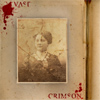 What Turquoise lacks lyrically, Crimsonmore than makes up for. Any album that starts off with "I know you justwant to kill me" is going to ride a rollercoaster of emotions, and onthese songs Crosby lets out all the demons to play. Thematically, thisgroup is also about bitterness and loss, but the feeling is conveyedwith a lighter brush. With the exception of a few songs, this would beconsidered the mellow record, and the confidence is all but replaced bycrippling doubt and insecurity. Where the songs on Turquoise seem to fit together, there is a start and stop on Crimsonwhere things don't exactly match up, and that seems to be part of thepoint. Harder-edged songs are there to break up the monotony andoverwhelming depression, but also to jar and bring across a feeling ofuncomfortability. True, they're demos, but they were arranged this wayfor a purpose. Nevertheless, the songs may not be as agressive, butthey're just as impressive. "I Need to Say Goodbye" is the ultimatekiss-off, the "I won't be played with" song that hits where it hurts."Winter in My Heart" and "Where it Never Rains" bring across both sidesof the love coin, where it's missing and desperately wanted and whereit's found and is clutched at tightly in the hope that it won't go awayagain. The only misstep is the heavy-handed social commentary of"That's My Boy," which seems to be an examination of the culture thatproduced the killers of Columbine. Crosby doesn't complete the thought,and switches to a faith examination that confuses the issue, so thesong doesn't hit the right switches. Overall, it's a minor flaw, andboth mini-albums have enough strong songs to make a fine album. Bothare a step beyond his previous work, and with the right fixing theycould be the makings of the best Vast album yet.
What Turquoise lacks lyrically, Crimsonmore than makes up for. Any album that starts off with "I know you justwant to kill me" is going to ride a rollercoaster of emotions, and onthese songs Crosby lets out all the demons to play. Thematically, thisgroup is also about bitterness and loss, but the feeling is conveyedwith a lighter brush. With the exception of a few songs, this would beconsidered the mellow record, and the confidence is all but replaced bycrippling doubt and insecurity. Where the songs on Turquoise seem to fit together, there is a start and stop on Crimsonwhere things don't exactly match up, and that seems to be part of thepoint. Harder-edged songs are there to break up the monotony andoverwhelming depression, but also to jar and bring across a feeling ofuncomfortability. True, they're demos, but they were arranged this wayfor a purpose. Nevertheless, the songs may not be as agressive, butthey're just as impressive. "I Need to Say Goodbye" is the ultimatekiss-off, the "I won't be played with" song that hits where it hurts."Winter in My Heart" and "Where it Never Rains" bring across both sidesof the love coin, where it's missing and desperately wanted and whereit's found and is clutched at tightly in the hope that it won't go awayagain. The only misstep is the heavy-handed social commentary of"That's My Boy," which seems to be an examination of the culture thatproduced the killers of Columbine. Crosby doesn't complete the thought,and switches to a faith examination that confuses the issue, so thesong doesn't hit the right switches. Overall, it's a minor flaw, andboth mini-albums have enough strong songs to make a fine album. Bothare a step beyond his previous work, and with the right fixing theycould be the makings of the best Vast album yet. 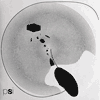 There's altogether too much dilettantism(
There's altogether too much dilettantism(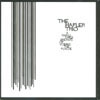 Though I only noticed IT as IT came screaming at my face, the aftermath(the dreams I inflicted upon my lack-of-consciousness through sheerforce of will) was fertilized with ITs form and ferocity. IT was ascattered being made both of sound and image though not entirely solidas if IT were completely of the extended realm. Imagine frames orshards of glass excreting tuneless television stations; nothing butstatic and bursts of images from some broadcast somewhere in theuniverse. Women's voices singing out, exaggerating pain, pleasure, andimagination (though it may be argued that these are really not seperateexperiences). While in my dizzying dream these shards leaned over meand felt their way beyond my oblique and stationary body to the roombeyond where all manner of colors were spilling forth as if the glow ofan old stereo receiver were ejaculating its contents onto the floor andinto the air. I became terrified when ITs voice went metallic andscratched its way into the air with a hiss and scream. I could not moveand there were bells in my ears, now. Perhaps this was the sound offear but my curiousity immediately took control and rendered the airabout me into black cloth and various shades of curtains. I rose andthrew back each cover as if searching for a toy I had lost anddesperately wanted back in my arms. I knew that broken image wassomewhere in this maze, too and so each movement breathed nervoussounds and anxious movements. The glow was there, ITs unearthly aurashining through the ether blinding the meters in front of me. There wasbut one final action for me to take and as I threw adrift the finalveil ITs facade lifted. I stared at her and laughed knowing it meantsomething only so long as I lived.
Though I only noticed IT as IT came screaming at my face, the aftermath(the dreams I inflicted upon my lack-of-consciousness through sheerforce of will) was fertilized with ITs form and ferocity. IT was ascattered being made both of sound and image though not entirely solidas if IT were completely of the extended realm. Imagine frames orshards of glass excreting tuneless television stations; nothing butstatic and bursts of images from some broadcast somewhere in theuniverse. Women's voices singing out, exaggerating pain, pleasure, andimagination (though it may be argued that these are really not seperateexperiences). While in my dizzying dream these shards leaned over meand felt their way beyond my oblique and stationary body to the roombeyond where all manner of colors were spilling forth as if the glow ofan old stereo receiver were ejaculating its contents onto the floor andinto the air. I became terrified when ITs voice went metallic andscratched its way into the air with a hiss and scream. I could not moveand there were bells in my ears, now. Perhaps this was the sound offear but my curiousity immediately took control and rendered the airabout me into black cloth and various shades of curtains. I rose andthrew back each cover as if searching for a toy I had lost anddesperately wanted back in my arms. I knew that broken image wassomewhere in this maze, too and so each movement breathed nervoussounds and anxious movements. The glow was there, ITs unearthly aurashining through the ether blinding the meters in front of me. There wasbut one final action for me to take and as I threw adrift the finalveil ITs facade lifted. I stared at her and laughed knowing it meantsomething only so long as I lived. Simultaneously released with their Rebel Powers' Not One Star Will Stand the Night, Emi Nobuko, Higashi Hiroshi, and Kawabata Makoto's Gekkyukekkaichiserves as a kind of companion to the dark, gnashing tones of theformer. The modus operandi is the same: two extended tracks, an hour intotal, of free improvisation without cuts or overdubs. These are meantto be pure, unadulterated acidic shots to the senses. Unlike RebelPowers, which delved into heavy blacks and grays, the immediate tone ofGekkyukekkaichi is one more concerned with points of light,shimmering into view and filling the senses. The intensity andextremity still exists, but it isn't a lurching menace: it is containedin a more dynamic wash of colors and shapes. The title track twistsaround itself as Makoto's fully live guitar kicks up dust amidst thesparse percussion. It is the sounds of what is seen after looking at abright light for too long and then closing the eyes. The after effectslinger on the cornea like a mix of spectral ghosts, rushing forwardbefore shaking themselves apart to make way for the next hits of eyedamage. It hurts, but it's just so cool to watch. A short interlude inthe middle of the storm allows for a breather before amplifying theenergy to even greater heights for the closing. When "Seiitenrinengi"begins, the restraint in its form is startling compared to the titletrack. Here, there seems to be more method than madness, less staringat the sun and more looking at what it is shining upon. It feels like alandscape soundtrack with the music gently rising and falling to matchthe terrain and trace its image in sound. Nearly ten minutes into thepiece, the landscape takes a harsh turn, and the music rapidly climbsin strength and speed as if the ground just broke out from underneathit. It's a high-speed plunge that sears the eardrums with nasty squallsof white noise and high-pitched, screaming drones. This movement comescrashing to an end and the music sputters, plucks, and taps along thesilence that is now visible as the waves of noise dissipate. Whatemerges from this break is a more focused movement, seeming to meld thefirst controlled section with the second freak-out section. Now, likeany long form piece, there are moments of power that draw the listenerin with their intricacy and inventiveness, but there are also stretcheswhere the needle skips the groove and things just aren't clickingright. Gekkyukekkaichi is a more consistently solid effort than Not One Star Will Stand the Night,but what they share in method and design also leads to them sharinginadequacies. The extended, improvised, one take style results in anaimless, drifting section, or a place where the music could havepossible used a little editing. Still, despite those little deathsalong the way, there are moments of great ideas in these long pieces,and they make for an illuminating listen.
Simultaneously released with their Rebel Powers' Not One Star Will Stand the Night, Emi Nobuko, Higashi Hiroshi, and Kawabata Makoto's Gekkyukekkaichiserves as a kind of companion to the dark, gnashing tones of theformer. The modus operandi is the same: two extended tracks, an hour intotal, of free improvisation without cuts or overdubs. These are meantto be pure, unadulterated acidic shots to the senses. Unlike RebelPowers, which delved into heavy blacks and grays, the immediate tone ofGekkyukekkaichi is one more concerned with points of light,shimmering into view and filling the senses. The intensity andextremity still exists, but it isn't a lurching menace: it is containedin a more dynamic wash of colors and shapes. The title track twistsaround itself as Makoto's fully live guitar kicks up dust amidst thesparse percussion. It is the sounds of what is seen after looking at abright light for too long and then closing the eyes. The after effectslinger on the cornea like a mix of spectral ghosts, rushing forwardbefore shaking themselves apart to make way for the next hits of eyedamage. It hurts, but it's just so cool to watch. A short interlude inthe middle of the storm allows for a breather before amplifying theenergy to even greater heights for the closing. When "Seiitenrinengi"begins, the restraint in its form is startling compared to the titletrack. Here, there seems to be more method than madness, less staringat the sun and more looking at what it is shining upon. It feels like alandscape soundtrack with the music gently rising and falling to matchthe terrain and trace its image in sound. Nearly ten minutes into thepiece, the landscape takes a harsh turn, and the music rapidly climbsin strength and speed as if the ground just broke out from underneathit. It's a high-speed plunge that sears the eardrums with nasty squallsof white noise and high-pitched, screaming drones. This movement comescrashing to an end and the music sputters, plucks, and taps along thesilence that is now visible as the waves of noise dissipate. Whatemerges from this break is a more focused movement, seeming to meld thefirst controlled section with the second freak-out section. Now, likeany long form piece, there are moments of power that draw the listenerin with their intricacy and inventiveness, but there are also stretcheswhere the needle skips the groove and things just aren't clickingright. Gekkyukekkaichi is a more consistently solid effort than Not One Star Will Stand the Night,but what they share in method and design also leads to them sharinginadequacies. The extended, improvised, one take style results in anaimless, drifting section, or a place where the music could havepossible used a little editing. Still, despite those little deathsalong the way, there are moments of great ideas in these long pieces,and they make for an illuminating listen.  I'm consistently impressed by that essential spark in the Japanesecreative potential that seems uncannily able to co-opt elements ofWestern culture and effortlessly transform them into a postmodernhybrid that is strangely familiar, yet entirely alien. There are clearforerunners for the sound of the Acid Mothers Temple — the space-rockof Hawkwind, the fuzz-metal of Blue Cheer and the hippie cult music ofAmon Duul II — and yet guru Kawabata Makoto and his family never engagein heavy-handed imitations of these influences. This cult of shaggy,unwashed heathens has repeatedly shown its talent for creatingforcefully original material that pays homage to its godfathers evenwhile joyously trampling on their graves. Magical Power From Marsis the latest addition to the Temple's absurdly prolific discography.This CD collects the three limited edition hologram EPs released byImportant Records earlier this year, and adds one bonus track availableonly on this release. The cover is another inspired lenticularspacescape - a retro-futurist scene resembling a 1920 World's Fairartist's rendering of humanity's inevitable colonization of Mars. Thetrack titles are puns on glam-era Bowie, oddly appropriate for thesefour massive, cosmic slabs of flamboyantly exaggerated rock n' roll."Ziggy Sitar Dust Raga" feels like an uneasy countdown: a persistentsitar scale backed by lunar synthesizers and a galaxy of hazyreverberations. This track kept me on the edge of my seat waiting forthe eventual onslaught. Ten minutes in, Cotton Casino's "Prepare fortakeoff!" shrieks made me feel ever closer to the inevitable launch.Twenty minutes later and surprise! No liftoff. It's all wind-up with noexplosion, like a long, exhausting tantric sex ritual. The second andfinest track, "Diamond Doggy Peggy," starts with Casino's possessedululations, before kicking the Acid Mothership into high shamanic gear,Makoto's hyperspeed guitar loosening its lysergic vibrations out intothe solar system. Cotton Casino's chirping synths sprinkle fairy dust(or angel dust?) over the cosmic proceedings. The bonus track, "AladdinKane," is a showcase for the Temple's synth and backwards-guitarprowess: a Joe Meek-meets-Tangerine Dream breakdown of galacticproportions. It's a haunting and genuinely creepy track that meandersthrough black holes and nebulous corridors, asking far more questionsthan it answers. "Cosmic Funky Dolly" is the final insult, a 20-minuteanomalous orbit that reverses the polarities of inner and outer spaceas it burns up on re-entry. This final track plays like a remake ofKubrick's 2001: A Space Odyssey directed by Shinya Tsukamoto and starring the Manson Family. Luckily, the incomprehensibly galactic Magical Power From MarsCD conveniently arrives just in time to pop it in the player, drop acidand peruse the new high-powered telescope photographs of the RedPlanet.
I'm consistently impressed by that essential spark in the Japanesecreative potential that seems uncannily able to co-opt elements ofWestern culture and effortlessly transform them into a postmodernhybrid that is strangely familiar, yet entirely alien. There are clearforerunners for the sound of the Acid Mothers Temple — the space-rockof Hawkwind, the fuzz-metal of Blue Cheer and the hippie cult music ofAmon Duul II — and yet guru Kawabata Makoto and his family never engagein heavy-handed imitations of these influences. This cult of shaggy,unwashed heathens has repeatedly shown its talent for creatingforcefully original material that pays homage to its godfathers evenwhile joyously trampling on their graves. Magical Power From Marsis the latest addition to the Temple's absurdly prolific discography.This CD collects the three limited edition hologram EPs released byImportant Records earlier this year, and adds one bonus track availableonly on this release. The cover is another inspired lenticularspacescape - a retro-futurist scene resembling a 1920 World's Fairartist's rendering of humanity's inevitable colonization of Mars. Thetrack titles are puns on glam-era Bowie, oddly appropriate for thesefour massive, cosmic slabs of flamboyantly exaggerated rock n' roll."Ziggy Sitar Dust Raga" feels like an uneasy countdown: a persistentsitar scale backed by lunar synthesizers and a galaxy of hazyreverberations. This track kept me on the edge of my seat waiting forthe eventual onslaught. Ten minutes in, Cotton Casino's "Prepare fortakeoff!" shrieks made me feel ever closer to the inevitable launch.Twenty minutes later and surprise! No liftoff. It's all wind-up with noexplosion, like a long, exhausting tantric sex ritual. The second andfinest track, "Diamond Doggy Peggy," starts with Casino's possessedululations, before kicking the Acid Mothership into high shamanic gear,Makoto's hyperspeed guitar loosening its lysergic vibrations out intothe solar system. Cotton Casino's chirping synths sprinkle fairy dust(or angel dust?) over the cosmic proceedings. The bonus track, "AladdinKane," is a showcase for the Temple's synth and backwards-guitarprowess: a Joe Meek-meets-Tangerine Dream breakdown of galacticproportions. It's a haunting and genuinely creepy track that meandersthrough black holes and nebulous corridors, asking far more questionsthan it answers. "Cosmic Funky Dolly" is the final insult, a 20-minuteanomalous orbit that reverses the polarities of inner and outer spaceas it burns up on re-entry. This final track plays like a remake ofKubrick's 2001: A Space Odyssey directed by Shinya Tsukamoto and starring the Manson Family. Luckily, the incomprehensibly galactic Magical Power From MarsCD conveniently arrives just in time to pop it in the player, drop acidand peruse the new high-powered telescope photographs of the RedPlanet. 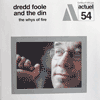 A strange album that, try as I may, I can't help but like. It's theposturing evident on the packaging that's off-putting, borrowed cachetfrom old-fashioned fine art records (that's just sooo SYR) and oldschool improv. I guess that stuff works to an extent and you can'tblame folk for wanting to sell their disks. The music, on the otherhand, is handily distinct and functional. At heart its live recordingof a psychedelic group improvisation blow-out: three guitars (ThurstonMoore, Patrick Best and Jack Rose) plus Indian strings (Mike Gangloff)build a great big flat wall of atonal drone, skitter and feedbackagainst which Chris Corsano drums up a furious pounding storm andthrough which Foole's (Dan Ireton) heavily echoed and reverberatedvocal droning, shouting, and wailing tunelessly wanders. It's basicallyall noise played at a fairly static level with some embellishment.There's an impression of rather little interaction between theimprovisers for much of the way but that's looking at this the wrongway, as thought it were old-school improv (e.g. Company or AMM). Incontrast to that, what's really happening is what talented psychrockers do (did) in their long out-chorus extemporizations—the buildingup of one great big collective head-banging drone made up of as manycomponents as the band can muster. No one is trying to stand out frontin the sense of soloing or being a virtuoso and there's none of thechallenge-response approach—it's all collective action. What makes itstrange is the mix. You would be forgiven for not noticing Corsano'sdrumming, he's so low in the mix. Once you cotton on to thatcontribution the whole thing takes on a whole different aspect, turningfrom a nice little noise package into a dynamic driving rock-out.Foole's singing is primitive, musically-challenged but fairlyeffective. On most tracks he's just providing another element of thecollective din, adding color and a little humanity to the guitar ladenwhole. Emotionally powerful or aesthetically challenging he is not butthe heavy use of reverb etc. on his free-form vocalization brings anice 60s art experiment touch. I have a sense that the music isn'ttaking itself too seriously and that's also the key to enjoying it: agreat big indulgent degenerate-rock blow-out. How this release relatesto the two from the mid-80s when Ireton was collaborating with Missionof Burma alumni, I can't say, not having heard those. -
A strange album that, try as I may, I can't help but like. It's theposturing evident on the packaging that's off-putting, borrowed cachetfrom old-fashioned fine art records (that's just sooo SYR) and oldschool improv. I guess that stuff works to an extent and you can'tblame folk for wanting to sell their disks. The music, on the otherhand, is handily distinct and functional. At heart its live recordingof a psychedelic group improvisation blow-out: three guitars (ThurstonMoore, Patrick Best and Jack Rose) plus Indian strings (Mike Gangloff)build a great big flat wall of atonal drone, skitter and feedbackagainst which Chris Corsano drums up a furious pounding storm andthrough which Foole's (Dan Ireton) heavily echoed and reverberatedvocal droning, shouting, and wailing tunelessly wanders. It's basicallyall noise played at a fairly static level with some embellishment.There's an impression of rather little interaction between theimprovisers for much of the way but that's looking at this the wrongway, as thought it were old-school improv (e.g. Company or AMM). Incontrast to that, what's really happening is what talented psychrockers do (did) in their long out-chorus extemporizations—the buildingup of one great big collective head-banging drone made up of as manycomponents as the band can muster. No one is trying to stand out frontin the sense of soloing or being a virtuoso and there's none of thechallenge-response approach—it's all collective action. What makes itstrange is the mix. You would be forgiven for not noticing Corsano'sdrumming, he's so low in the mix. Once you cotton on to thatcontribution the whole thing takes on a whole different aspect, turningfrom a nice little noise package into a dynamic driving rock-out.Foole's singing is primitive, musically-challenged but fairlyeffective. On most tracks he's just providing another element of thecollective din, adding color and a little humanity to the guitar ladenwhole. Emotionally powerful or aesthetically challenging he is not butthe heavy use of reverb etc. on his free-form vocalization brings anice 60s art experiment touch. I have a sense that the music isn'ttaking itself too seriously and that's also the key to enjoying it: agreat big indulgent degenerate-rock blow-out. How this release relatesto the two from the mid-80s when Ireton was collaborating with Missionof Burma alumni, I can't say, not having heard those. -  Jan St. Werner has a way of keeping the flavor-seal closed tight.There's a freshness to everything he gets his hands on that isdownright addictive. When Mouse on Mars broke out, they gave bliss-outelectronic the funky backbone it needed to stay interesting; likewisein Microstoria, Werner contributed a tender roundness to Markus Popp'sdigital landscape. Scryptis the third album from St. Werner's more abstract solo projectLithops, and where the first two treaded heavily in a shaky land ofbedroom concréte and dissected electro, Scrypt marks aninvigoration of the Lithops sound.The obscure cover-art and vaguely archaic title paint an accuratepicture of the music inside. The common thread is, more than ever, St.Werner's layering of distorted drones and static pulse. This timearound, however, the cohesion achieved makes the even most complextracks sound elemental, as if gathered from the air. The first track,"Generator," acts as an overture, condensing the gamut of distortedplanes in which almost everything here is submerged. Throughout thedisc, as melody emerges from the fray, it is constructed of rich,droning bass and frayed, stuttering high notes. While on earlierLithops releases a deliberately "underproduced" quality permeated, on Scrypt,it has been tempered by a refined attention to placement. A cleartouchstone for much of this album would be the music of ChristianFennesz, except here somber guitars are replaced by bits of saccharinepop bliss and plodding bass notes, fractured in and out of the waves ofstatic. "Graind" contains a melodic hook that would easily feel at homein a DAT Politics tune.As always with St. Werner and the rest of his Sonig buddies, theelement of surprise is at a premium. Horns, woodwinds, trashcanpercussion, plunking guitars, and all variety of concréte pandering areat work creating music that is at once playful, challenging, and evenmelancholic. As with recent Mouse on Mars material, St. Werner standsalone here in his ability to rend unorthodox rhythms from the mostdiverse sonic tidbits and to bend these around an equally impressivearray of instruments. The results are never boring, and this is thebest Lithops music yet.
Jan St. Werner has a way of keeping the flavor-seal closed tight.There's a freshness to everything he gets his hands on that isdownright addictive. When Mouse on Mars broke out, they gave bliss-outelectronic the funky backbone it needed to stay interesting; likewisein Microstoria, Werner contributed a tender roundness to Markus Popp'sdigital landscape. Scryptis the third album from St. Werner's more abstract solo projectLithops, and where the first two treaded heavily in a shaky land ofbedroom concréte and dissected electro, Scrypt marks aninvigoration of the Lithops sound.The obscure cover-art and vaguely archaic title paint an accuratepicture of the music inside. The common thread is, more than ever, St.Werner's layering of distorted drones and static pulse. This timearound, however, the cohesion achieved makes the even most complextracks sound elemental, as if gathered from the air. The first track,"Generator," acts as an overture, condensing the gamut of distortedplanes in which almost everything here is submerged. Throughout thedisc, as melody emerges from the fray, it is constructed of rich,droning bass and frayed, stuttering high notes. While on earlierLithops releases a deliberately "underproduced" quality permeated, on Scrypt,it has been tempered by a refined attention to placement. A cleartouchstone for much of this album would be the music of ChristianFennesz, except here somber guitars are replaced by bits of saccharinepop bliss and plodding bass notes, fractured in and out of the waves ofstatic. "Graind" contains a melodic hook that would easily feel at homein a DAT Politics tune.As always with St. Werner and the rest of his Sonig buddies, theelement of surprise is at a premium. Horns, woodwinds, trashcanpercussion, plunking guitars, and all variety of concréte pandering areat work creating music that is at once playful, challenging, and evenmelancholic. As with recent Mouse on Mars material, St. Werner standsalone here in his ability to rend unorthodox rhythms from the mostdiverse sonic tidbits and to bend these around an equally impressivearray of instruments. The results are never boring, and this is thebest Lithops music yet. 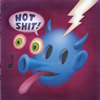 We live in interesting times, if I may make a grand understatement, andit's only natural that current events find their way into the realms ofart and music. Expressions of disillusionment with the currentpresidential administration, its policies, and the state of globalpolitics in general permeate this disc. It doesn't sound like a"message" record, though, and it's not a call to arms. Hot Shitis a documentation of the personal impressions of Sam Coomes and JanetWeiss, one which I'm sure is shared by many. They are worried aboutgovernment control, unnecessary wars, the erosion of freedom, and theconfusing jumble of fact and fiction that loads the world's newspaperstoday. On the title track, they immediately begin with a question."Wild goose or Holy Grail? / Red Herring or the Great White Whale?" Inessence, what's it all about? It is this sense of confusion that drivesmuch of the feelings behind the album. On "Seven Years Gone," Coomeseven admits about the newspapers that say America supports thepresident and the war on terror: "How much is lies and how much justunwise, I can't say." While Quasi is capable of detailing their concernthrough clever storytelling, their discernment occasionally lapses."White Devil's Dream," co-penned by Coomes and Weiss is the most directattack on the theme, calling out the names of the members of George W.Bush's administration and telling them to "fuck off." It's hardly anuanced critique on their policies and beliefs, but it does convey thefrustrated anger that the pair (and no doubt the others who will warmlyembrace this tirade) feels. Still, it is an unfortunate breach of thesubtlety and craft that Quasi displays on the other tracks. "Master andDog" is an allegory that accuses world leaders (this time, not by name)of taking their people by the leash and forcing them into conflict.Neither side of the political spectrum is spared, as Coomes sings "Theelephant wields the rod / while the donkey throws you a bone / I'drather have a bone than a beating, I suppose / but either way it'sstill just master and dog." The lesser of two evils, indeed. Musically,Quasi is on target. They give off a loose, stompy rock sound thatperfectly suits Coomes vocals and Weiss' backup. It's particularlyupbeat for the subject matter. On "No One," they bring in wistfulstrings to add a poignant flavor to the track. It's a simple piece,hiding from all the world's troubles and seeking comfort and safety inthe warm embrace of a loved one. The sentiment and delivery is trulyaffecting. After the breakdown that is captured in "White Devil'sDream," the album takes a much more positive tone, emphasizing theimportance of individual vigilance and group strength in the face ofthese disheartening times. Hot Shit is a sympathetic record,one that echoes a lot of the more common thoughts people are struck bywhen confronted with the flood of graphic images and muddledinformation. It's a protest, sure, but one that doesn't stem from emptymotivations or sloganeering, instead coming from genuine emotion.
We live in interesting times, if I may make a grand understatement, andit's only natural that current events find their way into the realms ofart and music. Expressions of disillusionment with the currentpresidential administration, its policies, and the state of globalpolitics in general permeate this disc. It doesn't sound like a"message" record, though, and it's not a call to arms. Hot Shitis a documentation of the personal impressions of Sam Coomes and JanetWeiss, one which I'm sure is shared by many. They are worried aboutgovernment control, unnecessary wars, the erosion of freedom, and theconfusing jumble of fact and fiction that loads the world's newspaperstoday. On the title track, they immediately begin with a question."Wild goose or Holy Grail? / Red Herring or the Great White Whale?" Inessence, what's it all about? It is this sense of confusion that drivesmuch of the feelings behind the album. On "Seven Years Gone," Coomeseven admits about the newspapers that say America supports thepresident and the war on terror: "How much is lies and how much justunwise, I can't say." While Quasi is capable of detailing their concernthrough clever storytelling, their discernment occasionally lapses."White Devil's Dream," co-penned by Coomes and Weiss is the most directattack on the theme, calling out the names of the members of George W.Bush's administration and telling them to "fuck off." It's hardly anuanced critique on their policies and beliefs, but it does convey thefrustrated anger that the pair (and no doubt the others who will warmlyembrace this tirade) feels. Still, it is an unfortunate breach of thesubtlety and craft that Quasi displays on the other tracks. "Master andDog" is an allegory that accuses world leaders (this time, not by name)of taking their people by the leash and forcing them into conflict.Neither side of the political spectrum is spared, as Coomes sings "Theelephant wields the rod / while the donkey throws you a bone / I'drather have a bone than a beating, I suppose / but either way it'sstill just master and dog." The lesser of two evils, indeed. Musically,Quasi is on target. They give off a loose, stompy rock sound thatperfectly suits Coomes vocals and Weiss' backup. It's particularlyupbeat for the subject matter. On "No One," they bring in wistfulstrings to add a poignant flavor to the track. It's a simple piece,hiding from all the world's troubles and seeking comfort and safety inthe warm embrace of a loved one. The sentiment and delivery is trulyaffecting. After the breakdown that is captured in "White Devil'sDream," the album takes a much more positive tone, emphasizing theimportance of individual vigilance and group strength in the face ofthese disheartening times. Hot Shit is a sympathetic record,one that echoes a lot of the more common thoughts people are struck bywhen confronted with the flood of graphic images and muddledinformation. It's a protest, sure, but one that doesn't stem from emptymotivations or sloganeering, instead coming from genuine emotion. 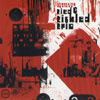 It's been two years since German electronic/jazz collective Tied and Tickled Trio released their fine Electric Avenue Tapes disc, and with good reason. In part, the core rhythm section of brothers Micha and Markus Acher had spent a great deal of time perfecting the sound of their other group the Notwist's last disc, while also recording and performing with separate projects Ms John Soda and Lali Puna.
It's been two years since German electronic/jazz collective Tied and Tickled Trio released their fine Electric Avenue Tapes disc, and with good reason. In part, the core rhythm section of brothers Micha and Markus Acher had spent a great deal of time perfecting the sound of their other group the Notwist's last disc, while also recording and performing with separate projects Ms John Soda and Lali Puna. Guitarist Stephen O'Malley has played in a number of twistedsludge-metal bands — notably Thorr's Hammer, Blind Idiot God andBurning Witch — but his work in Sunn O))) is what has gained himnotoriety outside of the insular indie-metal scene. Sunn O)))'soppressive, effects-laden guitar drones have impressed devotees ofnoise and experimental music, as well as listeners of post-industrialand neo-psychedelia. Stephen O'Malley's new band Khanate shares much ofthe shattering doomcore of Sunn O))), without the strict musicalasceticism. The addition of James Plotkin on bass,singer Alan Dubin (of OLD) and drummer Tim Wyskida fills out the sound,bringing Khanate out of the depths of harsh, noisy minimalism and intothe realm of more-or-less traditional metal. Khanate's self-titleddebut for Southern Lord was a slow-motion tribute to the Nordic deathmetal of bands like Burzum, Dimmu Borgir and Borknagar. This new 12" onLoad Records, home to many terrifically bizarre post-metal bands,contains a remix of the song "No Joy" from the first album, and a newtrack "Dead" on the b-side. James Plotkin's added touches to thefrighteningly macabre "No Joy" turn the song into a brutal,mind-crushing dirge, a post-apocalyptic tribute to The Stooges' "NoFun." No fun, indeed, as the nine-minute track is warped and extendedfor maximum oppression and mental violence. O'Malley's guitar deliversthe painstakingly sluggish, catastrophic riffs that caused Julian Copeto exclaim that "slow is the new loud." The drums are also playedachingly slow, with monolithic forcefulness in every excruciating beat.Dubin's high-pitched shriek-singing shares the same terrifying,evocative morbidity as Tom Araya's Reign in Blood-era vocalsfor Slayer: "No joy/No fucking joy/Only hate." Plotkin's extraproduction touches intensify the song's darkness and brutality, addingelectronic stutters, time-stretching, creepy whispers and ghostlymetallic phasing. The b-side, "Dead," is a previously unreleased tracktaken from the same sessions as their upcoming full-length album onSouthern Lord. It is a similarly oppressive slab of queasy, ambientdoomcore, but this time Dubin's desolate vocals are more emphasized inthe mix: "I was visible/But not seen/Deserted/Alone." Plotkin addsunexpected digital smudges, squalls and glitches to this track,indicating a more experimental direction for the band. What I find soimpressive about Khanate is their exaggerated but ascetic musicalvocabulary: each element is carefully formulated to impart maximumdread, pathos and painful aggression. It's extremely theatrical,completely original, and ultimately very satisfying.
Guitarist Stephen O'Malley has played in a number of twistedsludge-metal bands — notably Thorr's Hammer, Blind Idiot God andBurning Witch — but his work in Sunn O))) is what has gained himnotoriety outside of the insular indie-metal scene. Sunn O)))'soppressive, effects-laden guitar drones have impressed devotees ofnoise and experimental music, as well as listeners of post-industrialand neo-psychedelia. Stephen O'Malley's new band Khanate shares much ofthe shattering doomcore of Sunn O))), without the strict musicalasceticism. The addition of James Plotkin on bass,singer Alan Dubin (of OLD) and drummer Tim Wyskida fills out the sound,bringing Khanate out of the depths of harsh, noisy minimalism and intothe realm of more-or-less traditional metal. Khanate's self-titleddebut for Southern Lord was a slow-motion tribute to the Nordic deathmetal of bands like Burzum, Dimmu Borgir and Borknagar. This new 12" onLoad Records, home to many terrifically bizarre post-metal bands,contains a remix of the song "No Joy" from the first album, and a newtrack "Dead" on the b-side. James Plotkin's added touches to thefrighteningly macabre "No Joy" turn the song into a brutal,mind-crushing dirge, a post-apocalyptic tribute to The Stooges' "NoFun." No fun, indeed, as the nine-minute track is warped and extendedfor maximum oppression and mental violence. O'Malley's guitar deliversthe painstakingly sluggish, catastrophic riffs that caused Julian Copeto exclaim that "slow is the new loud." The drums are also playedachingly slow, with monolithic forcefulness in every excruciating beat.Dubin's high-pitched shriek-singing shares the same terrifying,evocative morbidity as Tom Araya's Reign in Blood-era vocalsfor Slayer: "No joy/No fucking joy/Only hate." Plotkin's extraproduction touches intensify the song's darkness and brutality, addingelectronic stutters, time-stretching, creepy whispers and ghostlymetallic phasing. The b-side, "Dead," is a previously unreleased tracktaken from the same sessions as their upcoming full-length album onSouthern Lord. It is a similarly oppressive slab of queasy, ambientdoomcore, but this time Dubin's desolate vocals are more emphasized inthe mix: "I was visible/But not seen/Deserted/Alone." Plotkin addsunexpected digital smudges, squalls and glitches to this track,indicating a more experimental direction for the band. What I find soimpressive about Khanate is their exaggerated but ascetic musicalvocabulary: each element is carefully formulated to impart maximumdread, pathos and painful aggression. It's extremely theatrical,completely original, and ultimately very satisfying. The sinfully underhyped Kompakt label has a history of high-qualityreleases in the tech-house and micro-house subgenres, heralding theso-called Cologne Sound that those in the know cannot get enough of.While many house music peers seem content to release exclusively onvinyl, Kompakt is a trendsetter, regularly releasing what now appearsto be annual editions in the Total series of unmixed compilations. Featuring tracks from 12" singles as well as previously unreleased material, Total 5is the latest installment of top-notch tracks from the label'srespectable roster. SCSI-9, a Russian duo with several releases on theacclaimed Forcetracks imprint, opens the disc with "All She Wants Is,"a deep cut structured around a repetitious and incredibly catchy vocalhook and sizzling with a minimal drum loop and various synthembellishments. Superpitcher, who appeared on Total 4 with anelectroclashy number, transform the simplistic house groove of"Mushroom" into a beautiful and rather serene nature scene for theears, complete with simulated water droplets. While these two may straysomewhat from the well-beaten path of Cologne house, contributions fromPhong Sui, M. Mayer, and Reinhart Voigt present solid tunes bubblingover with warm synth pads and steady mechanical beats. If I had tochoose the highlight from the bunch, it would result in an admirabledraw. Potential techno "It boy" T. Raumschmiere of Novamute andShitkatapult fame drops a gooey track of the warbly bass and robot funkhe is currently championing. In contrast, The Orb co-conspirator andSun Electric mastermind Thomas Fehlmann makes a breathtaking appearancewith the gorgeous soft textures and tones of "Radeln." With captivatingdubby echoes and a genuine clickhouse groove, "Radeln" grew on meconsiderably more with each listen. You go buy now. I go eat sandwich.
The sinfully underhyped Kompakt label has a history of high-qualityreleases in the tech-house and micro-house subgenres, heralding theso-called Cologne Sound that those in the know cannot get enough of.While many house music peers seem content to release exclusively onvinyl, Kompakt is a trendsetter, regularly releasing what now appearsto be annual editions in the Total series of unmixed compilations. Featuring tracks from 12" singles as well as previously unreleased material, Total 5is the latest installment of top-notch tracks from the label'srespectable roster. SCSI-9, a Russian duo with several releases on theacclaimed Forcetracks imprint, opens the disc with "All She Wants Is,"a deep cut structured around a repetitious and incredibly catchy vocalhook and sizzling with a minimal drum loop and various synthembellishments. Superpitcher, who appeared on Total 4 with anelectroclashy number, transform the simplistic house groove of"Mushroom" into a beautiful and rather serene nature scene for theears, complete with simulated water droplets. While these two may straysomewhat from the well-beaten path of Cologne house, contributions fromPhong Sui, M. Mayer, and Reinhart Voigt present solid tunes bubblingover with warm synth pads and steady mechanical beats. If I had tochoose the highlight from the bunch, it would result in an admirabledraw. Potential techno "It boy" T. Raumschmiere of Novamute andShitkatapult fame drops a gooey track of the warbly bass and robot funkhe is currently championing. In contrast, The Orb co-conspirator andSun Electric mastermind Thomas Fehlmann makes a breathtaking appearancewith the gorgeous soft textures and tones of "Radeln." With captivatingdubby echoes and a genuine clickhouse groove, "Radeln" grew on meconsiderably more with each listen. You go buy now. I go eat sandwich.
